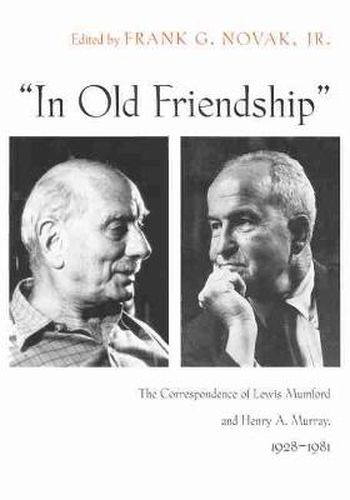Readings Newsletter
Become a Readings Member to make your shopping experience even easier.
Sign in or sign up for free!
You’re not far away from qualifying for FREE standard shipping within Australia
You’ve qualified for FREE standard shipping within Australia
The cart is loading…






Between 1928 and 1981, architectural and cultural critic Lewis Mumford exchanged nearly six hundred letters with Melville scholar and Harvard psychologist Henry A. Murray.
In Old Friendship
documents that richly rewarding interaction. Covering fifty years of devoted camaraderie between two exceptional minds, the book offers profound insights into the intellectual frustrations behind their significant careers and the emotional needs that framed their vibrant, often dramatic lives. To Mumford, a writer who sought to change the course of world events, iconoclastic Murray became a welcome confidant, critic, mentor, and friend. The letters reflect the wide range of public and private interests held by both men. Love’s entanglements are aired alongside literary labors. By chronicling the private worlds of these intellectual icons, this volume emerges as a crucial research tool for students of American intellectual history and culture, literary criticism, urbanism, architecture, and political arenas such as World War II and the Cold War. It offers a unique prism through which to observe the dramatic shifts in American society and culture in the twentieth century.
$9.00 standard shipping within Australia
FREE standard shipping within Australia for orders over $100.00
Express & International shipping calculated at checkout
Between 1928 and 1981, architectural and cultural critic Lewis Mumford exchanged nearly six hundred letters with Melville scholar and Harvard psychologist Henry A. Murray.
In Old Friendship
documents that richly rewarding interaction. Covering fifty years of devoted camaraderie between two exceptional minds, the book offers profound insights into the intellectual frustrations behind their significant careers and the emotional needs that framed their vibrant, often dramatic lives. To Mumford, a writer who sought to change the course of world events, iconoclastic Murray became a welcome confidant, critic, mentor, and friend. The letters reflect the wide range of public and private interests held by both men. Love’s entanglements are aired alongside literary labors. By chronicling the private worlds of these intellectual icons, this volume emerges as a crucial research tool for students of American intellectual history and culture, literary criticism, urbanism, architecture, and political arenas such as World War II and the Cold War. It offers a unique prism through which to observe the dramatic shifts in American society and culture in the twentieth century.